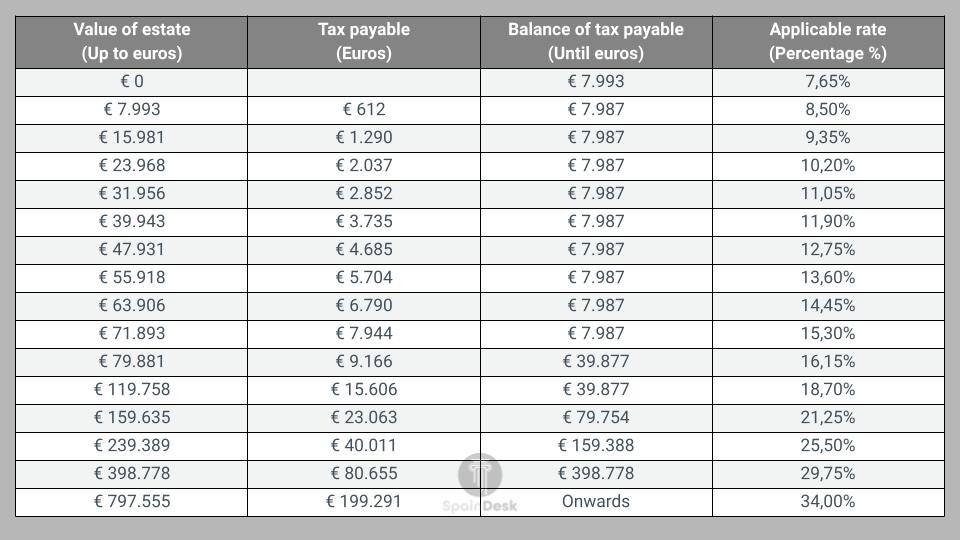Spanish Inheritance Tax: 4 Steps to Calculate it
Calculating the Spanish Inheritance Tax is not as simple as it appears. There are several aspects that need to be considered in order to calculate the amount of Spanish tax that will be due. In this article, we will take a look at key points that need to be considered when calculating the Spanish Inheritance Tax.
Content
Keypoints to calculate the Inheritance Tax in Spain
- The succession tax rate is calculated the same as the gift tax rate.
- The Inheritance Tax in Spain is generally set by the state, however sometimes the autonomous regions have set their own specific inheritance law and tax allowance.
- The Inheritance Tax Rate is a progressive tax.
- Tax residents and non-residents will pay different amounts of Inheritance Tax.
- Within the Spanish Inheritance, there are several allowances and reductions.
- Almost everybody (including children and spouses) needs to pay Inheritance Tax.
- Spanish Inheritance Tax doesn’t have to be paid if the deceased left everything to a spouse or children.
- To work out the amount of Spanish Inheritance Tax you’ll need to pay, you must first know the value of the estate. This includes all property, money, investments, and possessions.
- You will also need to take into account any debts that the deceased might have had.
- Inheritance Tax in Spain must be done within 6 months.
Table for the Inheritance Tax in Spain
Here are the tables used to calculate the Spanish Inheritance Tax when you are liable for the state tax.

4 steps to calculate Inheritance Tax
The inheritance process in Spain can be complicated and time-consuming, the Spanish inheritance law is broad. Calculating the Spanish Inheritance Tax is an important step to determine how much you will inherit. Below you find the three steps to find out how much Inheritance Tax you need to pay.
1. Determine the value of the assets
When you inherit assets in Spain, you will need to determine the tax value of those assets in order to calculate any Inheritance Taxes that may be due.
In the case of real estate, the cadastral registry is used to determine the property value. If the asset is a vehicle, you will need the initial price of the vehicle when it was new.
Next to property and cars, typical assets that are left behind are jewellery, antiques, and art. These items need to be assessed by an expert in order to determine their value for tax purposes.
Savings accounts or stocks and investments should of course also be taken into the calculation.
2. Determine whether the deceased was a tax resident or non-tax resident
The amount of Spanish Inheritance Tax you need to pay depends also on the fact whether your and the deceased person was tax resident or non-tax resident. If the deceased is a Spanish national or resident, you will be subject to Spanish inheritance and gift tax on their worldwide assets. However, if they are not a resident of Spain, you will only be subject to Spanish inheritance and gift tax on assets located in Spain. This is known as the “residency rule.” If the beneficiary is a resident of Spain, they will also be subject to inheritance and gift tax on assets gained outside of Spain.
You are considered to be a resident in Spain if you are there for more than 183 days during the year. If you live in Spain for less than 183 days, you will be considered a non-resident. Other reasons you may be considered a tax resident are if your main economic activity takes place in Spain or if your spouse or children live in the country.
There are some exceptions to this rule. For example, if you pay taxes in another EU country or another foreign country with which Spain has a double taxation agreement. You can avoid paying the Inheritance Tax in Spain because you are already paying the Inheritance Tax on the assets located outside of Spain. This is because Spain doesn’t want to give you a double taxation problem
3. Determine what the will says
If there is a Spanish Will for distributing the Spanish inheritance, it will need to be taken into account when calculating Inheritance Tax. The will may state that certain assets are to go to specific individuals. It may also specify that an Inheritance Tax is to be paid out of the estate before distributions are made to beneficiaries.
The Spanish will may also designate a spouse or registered partner as the sole heir. In this case, the surviving spouse may be exempt from paying Inheritance Tax.
If there is no Spanish will to distribute the Spanish Inheritance, the Spanish Inheritance Laws will apply.
Understanding the Spanish Will is important to understand how much succession tax you will need to pay, it will determine the amount of tax allowance you will have.
4. Adjust the taxable amount using deductions, allowances and rebates
There are a number of reductions and allowances that can be applied to the taxable amount in order to reduce the amount of Inheritance Tax that is owed. The most common tax reduction is the deduction for debts and expenses, which can reduce the taxable amount by up to 100%.
Spanish Inheritance Tax Rates are set by the autonomous region where the primary residence of the deceased person is located, and each autonomous region has its own rules regarding deductions, allowances and rebates.
Deductions include the deduction for family members that we discuss in the next part, a deduction from the funeral, a deduction on the age of the car, and a deduction for donations to charity.
Other tax allowances include the allowance for the principal residence, an allowance for small estates, an allowance for agricultural property, and an allowance for business assets.
Each of these deductions has specific requirements that must be met in order to qualify, so you will need to review the requirements carefully before claiming any deductions.
If the beneficiary already has existing wealth, this may impact the amount of tax that is owed on the inheritance. In general, the Spanish Inheritance Tax rules state that the taxable amount is increased by the value of any assets that the beneficiary already owns, similar to the wealth tax.
Get help with your Inheritance in Spain from a professional
Deductions for your Inheritance Tax
As discussed before, the Inheritance Tax in Spain is calculated for each beneficiary. Therefore the personal circumstances are taken into account. The amount the taxpayer will have to pay is based on a multiplier (coefficient or factor). The coefficient of relationship, age, disability, and existing assets of the beneficiary determines this ratio. The more distant the relationship to the deceased and the greater the existing wealth of the beneficiary the more tax will be owed.
Group I
In this category, children younger than 21 years of age are included. They will be exempt from Inheritance Tax for the first €47,859, which means they won’t have to pay any Inheritance Tax on the first €47,859.
Group II
In this category fall people over the age of 21, their children, spouses and parents/grandparents (including adoptive). They don’t have to pay tax up to €15,957.
Group III
The siblings, aunts, uncles, nieces, nephews, in-laws, and their descendants are among those who will receive an Inheritance Tax exemption of €7,993.
Group IV
The cousins, other relatives, unmarried partners (unless the region permits it) and those who are not related will be in the fourth category. They will not benefit from an Inheritance Tax exemption.
Disabilities
The government provides a disability benefit of €47,859 or €50,253 to those with impairments.
Where to pay Inheritance Tax in Spain
In Spain, the Inheritance Tax is regulated by both the state and the autonomous communities. The autonomous communities have the authority to set their own rates and thresholds, within certain limits set by the state.
As a result, the amount of Inheritance Tax that is payable can vary depending on where the property is located. If the autonomous community didn’t set its own rules, then the general Spanish Inheritance Law applies that the state has set.
Paying your Spanish Inheritance Tax is done on the website or via an appointment at the relevant autonomous community.
When to pay Spanish Inheritance Tax?
The Spanish Inheritance Tax must be paid within six months from the date of death, and late payments are subject to interest and penalties. There is no difference if you are a resident or non-resident of Spain.
During the time that the tax is being paid, some Spanish assets of the estate cannot be distributed to the heirs. If you are unable to pay the Inheritance Tax in full, you can arrange a payment plan with the autonomous region.
Get help with the Spanish Inheritance Tax
It is very common to seek professional help when dealing with the Spanish Inheritance Law, as it can be confusing. A good Inheritance Lawyer will know the ins and outs of the law and can guide you through the process to ensure that everything is done correctly.
They can also help you to minimise the amount of tax that you have to pay by taking advantage of deductions and exemptions.
If you are dealing with a complex estate, it is even more important to get professional help. An Inheritance Tax Lawyer can help to ensure that the estate is divided up correctly and that all of the paperwork is in order. Contact us today to speak to one of our experienced Spanish Inheritance Lawyers.
Get help with your Inheritance in Spain from a professional








